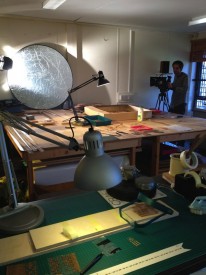
When I give talks to film students, they sometimes turn their noses up at the corporate and participatory video work I do around my own creative projects. They like to think they can come straight out of university and make only their dramatic masterpieces. Now, clearly corporates pay the rent whereas the more creative projects sadly don’t for most of us, but there are many other excellent reasons to do them:
- Transferable skills. By making corporates day in, day out, you’re keeping your camera, lighting, sound, editing and directing skills honed.
- Flexibility. It’s much easier to fit your creative projects around a freelance corporate video schedule than a nine-to-five day job. Even having to go to the job centre to sign on the dole every week can get in the way of your own films.
- Favours. To give just one example, a sound recordist is far more likely to work for free on your short film if you’ve hired him for several fully paid corporates jobs in the past.
- Finance. Over and above the fees they pay me, I’ve found my corporate clients to be some of my most generous supporters when it comes to investing in my films or contributing to crowd-funding campaigns. (See this post for evidence of this in the indisputable form of a pie chart.)
- Equipment. Your wife can’t complain about you buying a shiny new camera if you need it to earn money. And if you just happen to use it for your own projects too, well – everyone’s happy, aren’t they?
- Credits. Every corporate adds to your track record. An actor auditioning for your short, a funding agency panellist considering your application, a potential collaborator checking out your website – they’ll all be more impressed and more willing to trust you if they see a long list of corporate credits rather than a part-time shelf-stacking job on your CV.
- Dealing with feedback. We’ve all heard the horror stories of directors who’ve received notes from studio executives demanding that they change this or that. Learning to take on board the comments and suggestions of the clients who are paying for your corporates is great practice for this.
- Tax break. If you make money from filming, your expenses are tax deductible. And those expenses include the cost of making your own movies, because it’s all part of your business. Many’s the time I’ve lamented spending all my money on making films… until I received a “nothing to pay” statement from the Inland Revenue. Mmmm, nothing to pay.